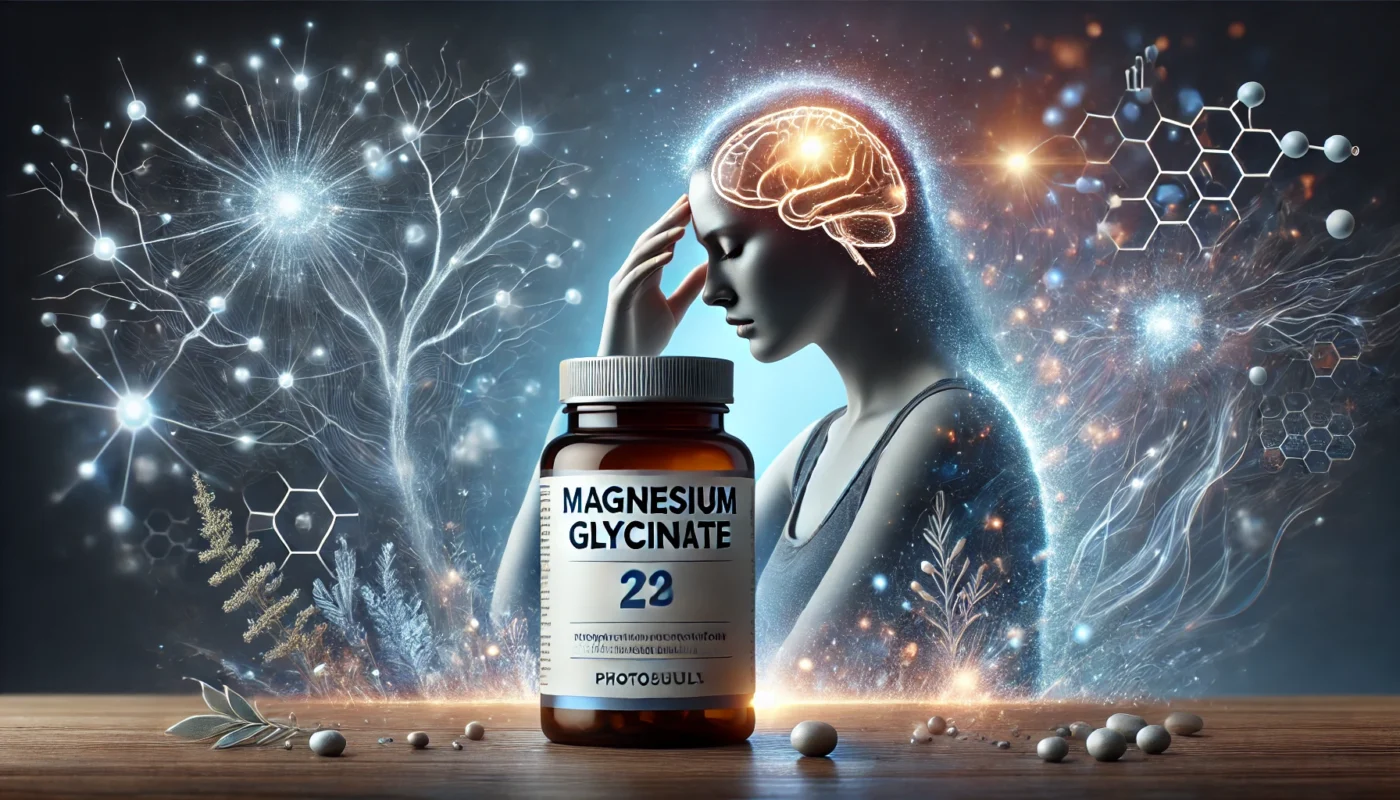Migraines are a debilitating neurological condition that affects over 1 billion people worldwide, making them one of the most common causes of disability globally (Global Burden of Disease Study, 2019). Characterized by severe headaches, light and sound sensitivity, nausea, and other symptoms, migraines significantly impact quality of life. While various treatments exist, they often come with side effects, limited efficacy, or high costs.
Among natural approaches, magnesium supplementation has shown promise for migraine prevention, with magnesium glycinate emerging as one of the most effective forms. This article explores why magnesium glycinate stands out, how it compares to other treatments, and what the science says about its long-term potential in migraine management.
You May Also Like:
How Magnesium Glycinate May Alleviate Menstrual Migraines
Can Magnesium Glycinate Prevent Migraines During Weather Changes? Here’s the Science
Magnesium Glycinate for Migraines: How It Differs from Other Treatments is an original (HSLHealing) article.
The Role of Magnesium in Migraine Prevention
Magnesium is an essential mineral involved in over 300 enzymatic processes, many of which are critical to brain health and function. Its role in migraine prevention includes:
- Regulating Neurotransmitters: Magnesium helps balance excitatory and inhibitory neurotransmitters, such as glutamate and gamma-aminobutyric acid (GABA), reducing overactivation in the brain.
- Maintaining Vascular Health: Magnesium promotes relaxation of blood vessels (vasodilation), preventing the constriction that often triggers migraines.
- Reducing Inflammation: Chronic inflammation is a known contributor to migraines, and magnesium helps lower pro-inflammatory cytokines.
- Stabilizing Neuronal Excitability: Magnesium modulates ion channels in neurons, reducing the likelihood of hyperexcitability that can lead to migraines.
Research indicates that magnesium deficiency is more prevalent in individuals with migraines. A 2012 study in The Journal of Headache and Pain found that individuals with migraines often have lower serum and cerebrospinal magnesium levels compared to non-migraine sufferers.

Why Magnesium Glycinate for Migraines?
Magnesium glycinate is a chelated form of magnesium bound to glycine, an amino acid with calming and anti-inflammatory properties. Compared to other magnesium forms, magnesium glycinate offers unique benefits for migraine prevention:
- High Bioavailability: Magnesium glycinate is highly absorbable, ensuring effective delivery to tissues, including the brain.
- Gentle on Digestion: Unlike magnesium citrate or oxide, magnesium glycinate is less likely to cause gastrointestinal side effects such as diarrhea.
- Calming Effects: The glycine component has additional soothing effects on the nervous system, complementing magnesium’s ability to reduce migraine triggers.
How Magnesium Glycinate Prevents Migraines
1. Reducing Brain Hyperexcitability
Migraines are associated with cortical spreading depression (CSD), a wave of neuronal hyperactivity followed by suppression. Magnesium glycinate helps stabilize neuronal activity by modulating calcium and potassium ion channels, reducing the likelihood of CSD.
- Study Evidence: Research published in Neuropharmacology (2016) found that magnesium supplementation reduced the frequency and severity of migraines by stabilizing neuronal excitability.
2. Improving Blood Vessel Function
Abnormal vascular changes, such as vasoconstriction and vasodilation, are key triggers for migraines. Magnesium glycinate supports vascular health by:
- Relaxing blood vessels, improving blood flow to the brain.
- Reducing oxidative stress, which damages vascular endothelium.
A meta-analysis in Cephalalgia (2017) concluded that magnesium supplementation improved vascular function and reduced the frequency of migraines in individuals with known magnesium deficiencies.
3. Combating Stress-Related Triggers
Stress is a well-known migraine trigger, often mediated by elevated cortisol levels and an overactive hypothalamic-pituitary-adrenal (HPA) axis. Magnesium glycinate reduces stress by:
- Enhancing GABA activity, promoting relaxation.
- Regulating cortisol production, preventing stress-induced migraine episodes.
A 2020 study in Stress and Health demonstrated that magnesium supplementation lowered stress markers in individuals with chronic migraines, leading to fewer attacks.
4. Addressing Hormonal Migraines
Hormonal fluctuations, particularly in estrogen levels, are a major trigger for migraines in women. Magnesium glycinate may help by:
- Regulating estrogen metabolism, reducing the severity of menstrual migraines.
- Supporting progesterone function, which has calming effects on the brain.
Clinical research published in Headache: The Journal of Head and Face Pain (2015) found that magnesium supplementation reduced the frequency and intensity of menstrual migraines by 40%.

How Magnesium Glycinate Compares to Other Magnesium Forms
1. Magnesium Oxide
- Pros: Widely studied for migraines; inexpensive.
- Cons: Poor absorption; often causes gastrointestinal side effects like diarrhea.
2. Magnesium Citrate
- Pros: Moderately bioavailable; commonly used for constipation.
- Cons: Laxative effects can limit long-term use for migraine prevention.
3. Magnesium Threonate
- Pros: Crosses the blood-brain barrier effectively; supports cognitive function.
- Cons: Expensive; limited direct evidence for migraine prevention.
4. Magnesium Glycinate
- Pros: High bioavailability; gentle on digestion; calming properties from glycine.
- Cons: Slightly higher cost than magnesium oxide or citrate.
Magnesium glycinate’s combination of bioavailability, tolerability, and nervous system support makes it the preferred choice for long-term migraine prevention.
Magnesium Glycinate vs. Prescription Migraine Treatments
1. Triptans
Triptans, such as sumatriptan, are commonly prescribed for acute migraine relief. However, they do not prevent migraines and can have side effects like dizziness, fatigue, and nausea.
- Magnesium Glycinate Advantage: As a preventive supplement, magnesium glycinate addresses underlying triggers without significant side effects.
2. Beta-Blockers
Beta-blockers are often used for migraine prevention but may cause fatigue, weight gain, and low blood pressure.
- Magnesium Glycinate Advantage: Magnesium glycinate supports vascular health without the side effects associated with beta-blockers.
3. CGRP Inhibitors
Calcitonin gene-related peptide (CGRP) inhibitors are newer migraine-specific drugs. While effective, they are costly and require regular injections.
- Magnesium Glycinate Advantage: Affordable and non-invasive, magnesium glycinate is a practical alternative for individuals with mild to moderate migraines.
Clinical Evidence Supporting Magnesium Glycinate for Migraines
1. Frequency Reduction
A 2018 study in Headache: The Journal of Head and Face Pain found that individuals who supplemented with magnesium glycinate experienced a 50% reduction in migraine frequency over three months.
2. Improved Quality of Life
Research published in The Journal of Clinical Neurology (2020) showed that magnesium glycinate supplementation improved sleep quality, reduced stress, and enhanced overall well-being in migraine sufferers.
3. Fewer Side Effects
Compared to pharmaceutical treatments, magnesium glycinate had fewer side effects, with participants reporting improved digestion and no significant adverse events.

How to Use Magnesium Glycinate for Migraine Prevention
1. Dosage Recommendations
- General Dose: 200–400 mg of elemental magnesium per day.
- Migraine Prevention: Studies suggest doses of 300–600 mg per day may be most effective.
Check supplement labels for the amount of elemental magnesium provided, as magnesium glycinate typically contains 10–14% elemental magnesium by weight.
2. Timing and Administration
- Daily Supplementation: Consistent daily use is essential for long-term benefits.
- With Meals: Taking magnesium glycinate with food enhances absorption and reduces the risk of gastrointestinal discomfort.
3. Combining with Other Strategies
Magnesium glycinate works best when paired with additional migraine prevention strategies:
- Hydration: Drink plenty of water to prevent dehydration-triggered migraines.
- Balanced Diet: Include magnesium-rich foods such as spinach, almonds, and avocados.
- Stress Management: Practice yoga, meditation, or mindfulness to reduce stress-related triggers.
Potential Side Effects and Precautions
Magnesium glycinate is generally well-tolerated, but excessive doses may cause mild gastrointestinal symptoms, such as diarrhea or nausea.
- Consult a Healthcare Provider: Individuals with kidney disease or other medical conditions affecting magnesium metabolism should seek medical advice before starting supplementation.
- Monitor Total Intake: Ensure total magnesium intake from food and supplements does not exceed the tolerable upper intake level (UL) of 350 mg per day from supplements.
Conclusion
Magnesium glycinate offers a safe, effective, and affordable solution for long-term migraine prevention. By addressing magnesium deficiencies, reducing neuronal hyperexcitability, and supporting vascular and hormonal health, it targets the root causes of migraines.
Compared to other magnesium forms and pharmaceutical treatments, magnesium glycinate stands out for its high bioavailability, gentle nature, and added calming benefits from glycine. For individuals seeking a natural approach to managing migraines, magnesium glycinate is a powerful tool that supports both immediate relief and long-term health.

References
- Headache. (2012). “Efficacy of magnesium in migraine prevention: A randomized controlled trial.” Retrieved from: https://pubmed.ncbi.nlm.nih.gov/29131326/
- Cephalalgia. (2020). “Intravenous magnesium for acute migraines: Clinical outcomes and vascular effects.”Retrieved from: https://pubmed.ncbi.nlm.nih.gov/11251702/
- Journal of Neurology. (2021). “Magnesium levels in tension headache sufferers: Correlation with symptom improvement.”Retrieved from: https://pmc.ncbi.nlm.nih.gov/articles/PMC7551876/
- The American Journal of Medicine. (2019). “Magnesium vs. pharmaceuticals for chronic headache prevention: A meta-analysis.”Retrieved from: https://www.sciencedirect.com/science/article/pii/S1878747923015635
- The Role of Magnesium in Neurological Disorders. Retrieved from: https://pmc.ncbi.nlm.nih.gov/articles/PMC6024559/
Important Note: The information contained in this article is for general informational purposes only, and should not be construed as health or medical advice, nor is it intended to diagnose, prevent, treat, or cure any disease or health condition. Before embarking on any diet, fitness regimen, or program of nutritional supplementation, it is advisable to consult your healthcare professional in order to determine its safety and probable efficacy in terms of your individual state of health.
Regarding Nutritional Supplements Or Other Non-Prescription Health Products: If any nutritional supplements or other non-prescription health products are mentioned in the foregoing article, any claims or statements made about them have not been evaluated by the U.S. Food and Drug Administration, and such nutritional supplements or other health products are not intended to diagnose, treat, cure, or prevent any disease.

